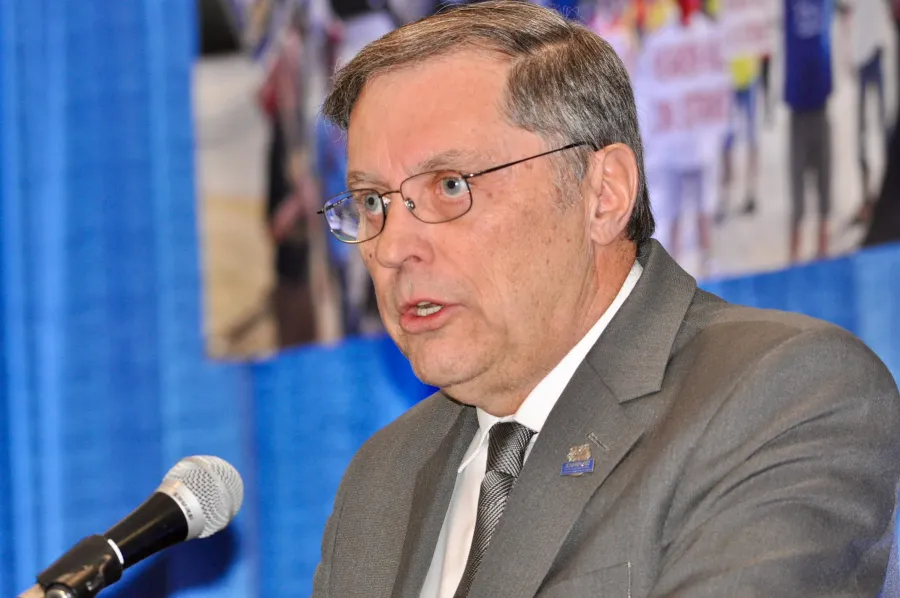Zuckerman: '340,000 Teamsters at UPS demanded the best contract in history and we didn't back down until we got it.'

EDITOR'S NOTE: This is the seventh in a series of stories on the just concluded 35th biennial Kentucky State AFL-CIO convention.
By BERRY CRAIG
Alliance for Retired Americans
Teamsters knew their contract negotiations with United Parcel Service “would set the tone for all of organized labor in this country,” Fred Zuckerman, the union's general secretary-treasurer, told delegates at the recent Kentucky State AFL-CIO convention in Lexington.
"We weren’t going to settle for anything less than the best contract ever at UPS, and that's exactly what we got," he added. "We took on one of the world's biggest corporations and forced it to reward our members in ways they had never done before. “More than 340,000 UPS Teamsters showed the world the positive difference belonging to a union makes for the working people.”
Zuckerman knew many of the delegates. He was president of Louisville-based Teamsters Local 89 for 23 years.
In November, 2021, the Teamster membership elected Sean O'Brien general president and Zuckerman general secretary on the O’Brien-Zuckerman Teamsters United Slate. The duo won by a 2-1 margin.
Zuckerman and three more national union leaders addressed the convention. The others were UAW President Shawn Fain; Sara Nelson, president of the Association of Flight Attendants-CWA; and UMWA President Cecil Roberts.
"The Teamsters national contract with UPS secured more for our members than any other single agreement in the 120-year history of our union," Zuckerman said. "This victory included historic wage increases for all part-time and full-time employees [and] no forced overtime."
In addition, UPS agreed to air conditioning in new parcel vans, and the company promised to retrofit old vans. The contract eliminated two-tier wages, and put all workers on an equal footing. "Raises for part-time workers in our new UPS contract are higher than all wage increases for part timers in the last 40 years," Zuckerman said.
Too, the Teamsters managed for the first time ever to claw back concessions made in previous contracts, according to Zuckerman. "It is by far the best contract ever secured for American workers at UPS, but the most important thing is how we were able to win that contract." He said the contract campaign featured unprecedented rank-and-file motivation and mobilization.
Zuckerman said the O'Brien-Zuckerman team recognized the importance of educating the public about what working at UPS is like for rank-and-file Teamsters. "These are hard jobs. They wear people down. They are also essential jobs in every sense of the word, and in today's world all of us rely on parcel delivery more than we ever have before."
At the same time, Teamster leadership agreed it was vital for UPS management to understand that the whole union backed their negotiators. "We also wanted management to see that this contract wasn't going to be like all the others. They needed to see our members were rallying....Business agents, shop stewards, principal officers, organizers, part-timers, full-timers, feeder drivers--everyone stepped up to the plate and played their part.
"Members shared leaflets and met early in the morning in parking lots. They filled out polls and surveys on the phones. Our campaign was built brick-by-brick with rank-and-file action coordinated throughout the country."
In the end, Zuckerman said, "340,000 Teamsters at UPS demanded the best contract in history, and we didn't back down until we got it."
He said 86 percent of the membership approved the contract. "We had a 57 percent turnout, the biggest voter turnout for a UPS contract in more than a generation. That was the result of the hard work, commitment and dedication of the...Teamsters at UPS."
Zuckerman said he was proud that he and O'Brien had "changed the culture of the international union when it comes to commitment to the rank-and- file. When Sean and I took office, we were adamant about giving the Teamsters union back to the members. Everything our administration does--every decision we make--is based on how it affects the rank-and-file members."
He said any success Teamster leadership enjoys comes from "the courage and conviction of our rank-and-file members who build our union every single day. They build union power, and they build density. Our rank-and-file gives us the energy to fight these employers. During the UPS campaign, our rank-and-file were out front-and-center in our videos, in social media and during press interviews."
Zuckerman also said that for the first time, rank-and-filers were on the national negotiating committee. "There is no substitute for having people on the negotiating committee who do the jobs every day--people that can give true testimonials on how bad the conditions are and how rotten management is--and because of that, they won a $30 billion contract."
But he characterized the contract victory as round one. "The fight isn't over because of what we won at the bargaining table. As everybody in this room already knows, our fight with companies like UPS is never over. We secured that historic contract, but now it's our job to enforce that agreement because, as you know, a union contract doesn't mean a damn thing if you don't enforce it."
He said every union "has to work every day to make companies comply with their obligations in the language of each contract. Enforcing our agreements is the key to organizing other companies. Our contract gives Teamsters real credibility when it comes to non-union workers at major employers like Amazon and Delta airlines."
He noted that public support for unions is surging in the public and pointed to several successful union drives recently in Louisville and nationwide. But he added that "corporate America continues to game the system," bankroll anti-labor politicians "and try everything it can to deny workers a fair shot."
Zuckerman concluded by urging delegates to "keep the momentum going--build upon it. Together there is more history to made in Kentucky and in the United States."